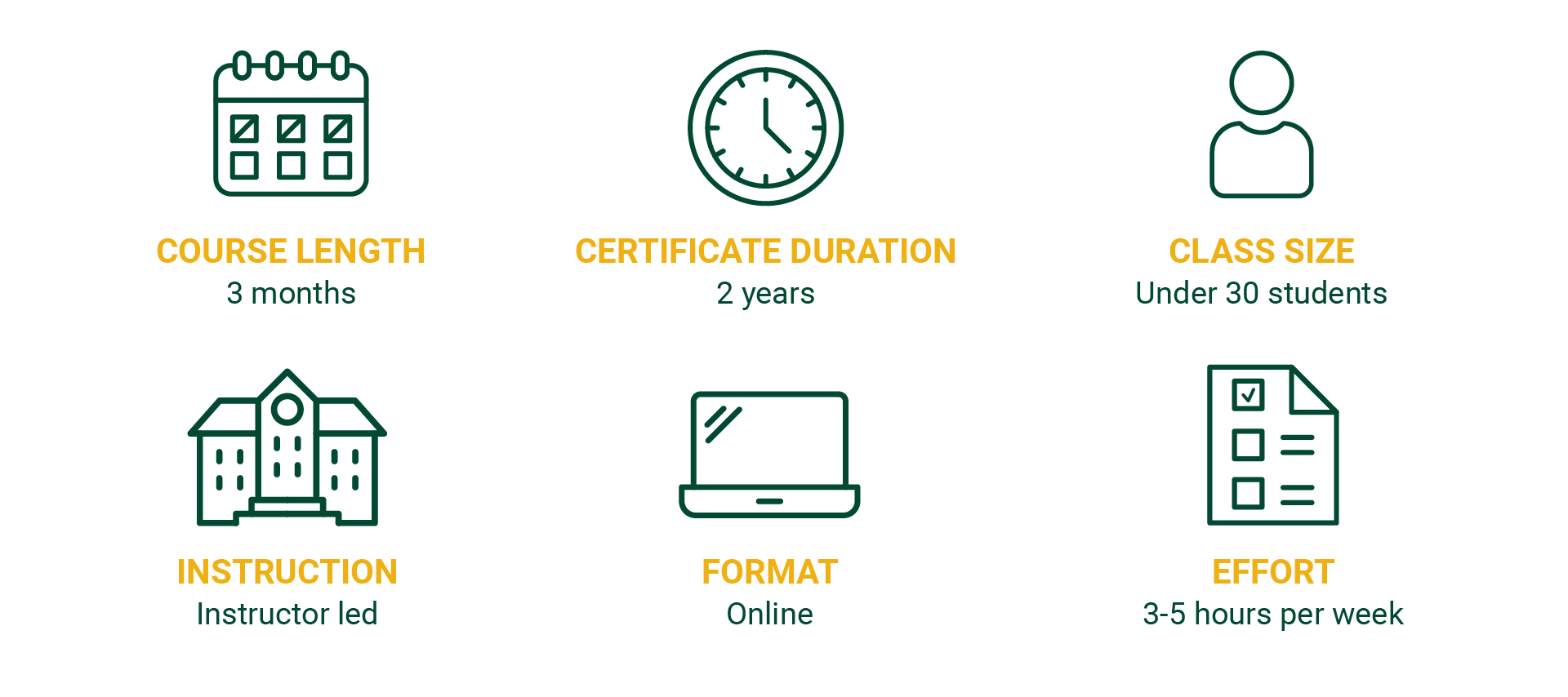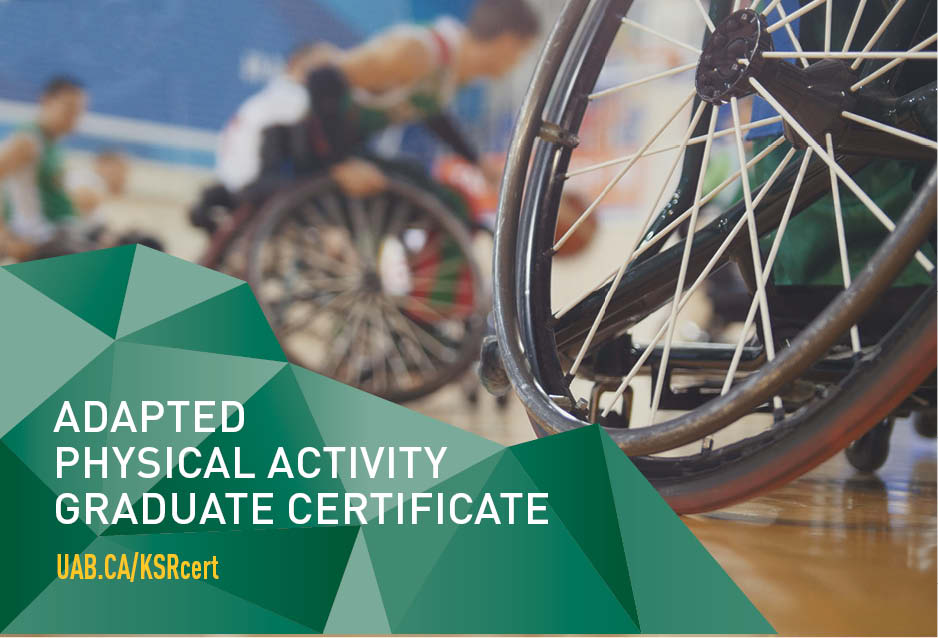Adapted Physical Activity Graduate Certificate
Boost your career and reduce barriers to active lifestyles and sports while fostering welcoming and supportive attitudes.
The focus of the Adapted Physical Activity Graduate Certificate is on using a disability-affirming approach to enhance professional practice and reflexive learning.
Students will explore trauma-informed practice, learn to coach athletes experiencing disability, understand program evaluation and assessment, practice accessibility design and advance critical thinking skills.
These skills will be taught within a larger context of equity, diversity, and inclusion (EDI).
This program will be of interest to:
- Individuals experiencing a disability or living with someone experiencing a disability
- Recreation and Leisure Professionals
- Tourism Professionals
- Provincial and National Sport Organizations
- Community Non-Profit Organizations
- Community Development Professionals
- Health Professionals
- Physical Educators
- Event Management
- Recreation Facilities Operators
- Fitness and Well-Being Professionals
- Allied Health Professionals
- Individuals working in Sport (including athletes and coaches)
- Community Service Professionals
This certificate is a graduate certificate and may be applied to a course-based master's degree in the Faculty of Kinesiology, Sport, and Recreation. Courses are delivered online, there is no in-class component.
Applications are now open! Students can begin in Fall or Winter. Application deadlines are:
- Fall: August 1
- Winter: December 1
Please see the FAQ section below for information on courses, tuition and program requirements.
How it Works

Courses are instructor-led and delivered online. They combine the best aspects of real time (synchronous) learning guided by your instructor and independent self-directed (asynchronous) study which can be accomplished according to your schedule.
Please note: there may be scheduled times in which students are expected to attend live online sessions.
Courses
Students are required to complete four courses, each worth 3 credits, for a total of 12 credits. There are eight courses to choose from. Courses are offered online only and students will have up to four years to complete the certificate.
The nature and number of courses offered in a calendar year will vary. All eight courses will not be offered each year.
- Critical survey of key topics in Adapted Physical Activity
- Program Evaluation and Assessment
- Being a Reflexive Practitioner
- Accessible Design for APA
- Instructional Approaches & Programming Models
- Coaching Athletes Experiencing Disability
- Integrating Disability Perspectives into APA Practices
- Trauma-informed practice
Courses and details listed below:
This course will involve a critical survey of topics and issues that are foundational to research, theory, and practice within adapted physical activity. Students will explore a range of topics that may include models of disability, social justice and intersectionality, and constraints and affordances that influence participation in physical activity and leisure by persons with impairments.
Students who successfully complete this course will be able to:
- Compare and contrast how models of disability influence practice in adapted physical activity settings
- Plan & develop strategies to utilize a disability affirming approach within adapted physical activity
- Differentiate between constraints and affordances, and illustrate how they impact participation in adapted physical activity
- Describe intersectionality and explain why it is important to adapted physical activity
- Acknowledge the influence of assumptions, experiences, and attitudes on professional practice
An examination of strategies approaches, and practices for assessing programs, and their impacts, within adapted physical activity and other related settings (e.g., rehabilitation).
Quantitative, qualitative, mixed, and alternative (e.g., arts-based) assessment methods will be introduced and critically analyzed, with an emphasis on disability-affirming approaches to each. This course will explore how to conduct various types of program evaluation (e.g., formative, summative, accountability-based) in a way that meaningfully engages stakeholders and shares learnings in an accessible, inclusive, and impactful way.
An overview of key concepts, issues related to accessible and universal design, as well as specific, actionable tools for assessing and creating more accessible physical spaces, online spaces, physical activity programs, media and communications, and well as learning experiences. This course will engage with access issues faced by a wide range of people, and be applied to contexts most relevant to course participants. They will also learn how to develop key organizational policies to support the creation of more accessible, inclusive, and equitable spaces.
An exploration of the various instructional approaches and programming models that are used within adapted physical activity settings, to promote innovative and cooperative service delivery. This course will include opportunities to apply theory in a real-life setting, which may involve acquiring practice-oriented tools to provide supports as needed and empower individuals. This course can either be fulfilled through an on-campus learning environment at the University of Alberta’s Steadward Centre for Personal and Physical Achievement, or through a pre-approved practice context negotiated by the course participant.
Disability-affirming practice requires engaging with thinkers and leaders who experience disability, as well as those with diverse disability experiences. Students will learn about how scholars, activists, and self-advocacy leaders who self-identify as Deaf, disabled, Mad, sick, and neurodivergent conceptualize their own bodies, minds, lives, and meaningful physical activities. Emphasis will be placed on how disabled and neurodivergent people’s lives are always impacted by equity issues relating to culture, religion, Indigeneity, race, gender, sexuality, newcomer status, class, and caste.
FAQs
- Have a working knowledge of how to manage sport and recreation organizations effectively in the public, non-profit/voluntary and commercial sectors, including facility and event management.
- Access, critique, and apply research to practice in order to foster ongoing professional growth.
- Apply critical thinking and problem solving skills to issues within adapted physical activity settings (i.e. sport, recreation, education, health, wellness, and fitness programming).
- Apply knowledge and skills to facilitate inclusion of individuals in a variety of movement settings
- Develop and demonstrate effective professional oral, written, and visual communication skills in the context of a leadership role.
- Reflect about and anticipate the impact of strategic decisions on adapted physical activity organizations and their stakeholders, including community members experiencing disability, caregivers, families, staff, and volunteers.
- Identify and problematize barriers/inhibitors/constraints, policies, ideas, and practices that marginalize or exclude people who experience disability.
- Apply equity, diversity, and inclusion lenses to policies, practices, and programs in order to support meaningful access for a broad range of participants.
This program will be of interest to:
- Individuals experiencing a disability or living with someone experiencing a disability
- Recreation and Leisure Professionals
- Tourism Professionals
- Provincial and National Sport Organizations
- Community Non-Profit Organizations
- Community Development Professionals
- Health Professionals
- Physical Educators
- Event Management
- Recreation Facilities Operators
- Fitness and Well-Being Professionals
- Allied Health Professionals
- Individuals working in Sport (including athletes and coaches)
- Community Service Professionals
- Eligible students will have an Undergraduate Degree, with a GPA of 3.0 (if you do not meet this, please contact the Manager, International and Community Education @ KSRCert@ualberta.ca)
- A current curriculum vitae/resume.
- A letter of intent.
- One professional letter of reference
Click here to apply.
